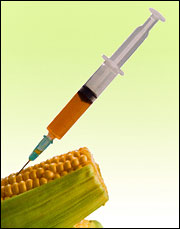Under President Clinton, genetically modified organisms (GMOs) entered the U.S. food supply with very little public input or independent testing. The precautionary principle crumbled under the weight of industry influence; Clinton staffed the FDA with biotech-industry insiders like Michael Taylor, who has spent his long career bouncing between the government payroll and Monsanto’s.

The official attitude toward testing the health implications of GMO food has been: let the industry conduct the studies. Not so shockingly, industry-funded studies have found no health problems associated with GMO foods. Today, upwards of 90 percent of U.S. soy, and 60 percent of U.S. corn, come from GMO seeds. Those crops suffuse our food supply; by some estimates, as much as 80 percent of processed food available in the United States contains GMO ingredients.
Meanwhile, there has been precious little independent research on GMOs and health. As Nancy Scola showed in a Gristmill post early this year, public funding for agriculture research has largely dried up, and Monsanto and other big agribusiness firms have filled the void, funneling fat grants to willing researchers.
But independent study of GMOs hasn’t ended completely. The government of Austria recently released the results of a long-term study showing that mice fed GM corn had lower birth rates and fewer offspring than their control-group peers.
From the Daily Mail:
The Austrian scientists performed several long-term feeding trials with laboratory mice over a course of 20 weeks. One of the studies was a so-called reproductive assessment by continuous breeding (RACB) trial, in which the same parent generation gave birth to several litters of baby mice. The parents were fed either with a diet containing 33 percent of GM maize, a hybrid of Monsanto’s MON 810 and another variety, and a normal feed mix. The team found changes that were ‘statistically significant’ in the third and fourth litters produced by the mice given a GM diet. There were fewer offspring, while the young mice were smaller. Prof Zentek said there was a direct link between the changes seen and the GM diet.
For years, the industry has fought back suspicion of GMO-linked health trouble by essentially saying: Hey, hundreds of million of Americans eat GMOs every day — if there were a problem, don’t you think we’d know it by now?
The GMO industry was essentially allowed to conduct an uncontrolled experiment on a population already consuming a highly processed diet low on key micronutrients and full of pesticide residues. Chronic diet-realted maladies were already on the rise.
I can see how adding yet one more toxic element to the diet could largely escape notice. The Austrian study should sound a warning call: It’s time to fund serious independent research of GMOs.
Let’s hope Obama keeps key federal agencies like FDA, EPA, and USDA free of GMO industry influence.

